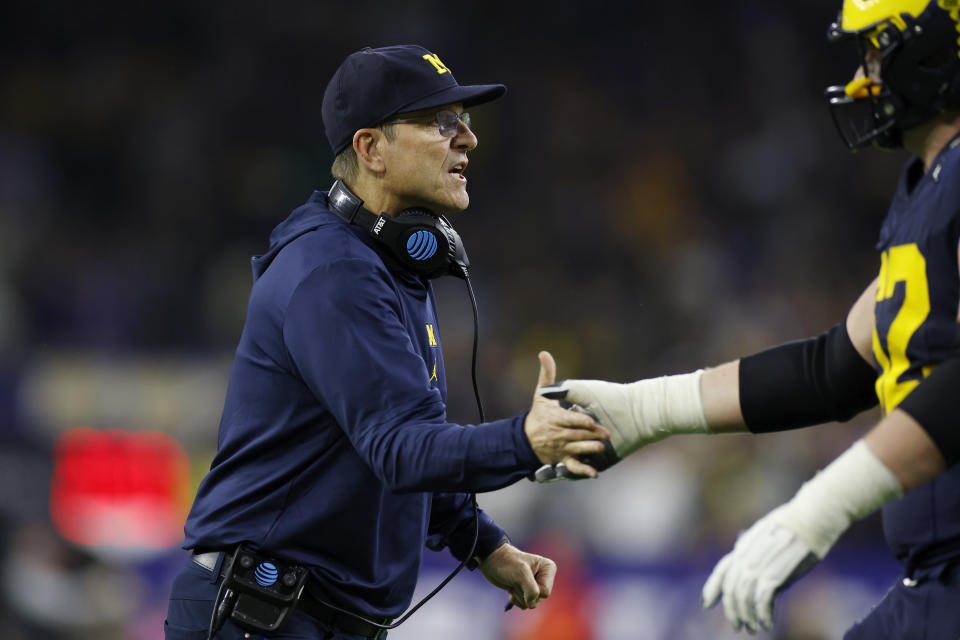NCAA Issues Four-Year Show-Cause Penalty to Jim Harbaugh Over Violations
The NCAA’s long-awaited ruling on Michigan Wolverines football coach Jim Harbaugh has dropped, and it’s a significant blow to the program. The governing body has issued a four-year show-cause penalty against Harbaugh, stemming from multiple Level I and Level II violations committed by the football program during the 2021 and 2022 seasons. This unprecedented penalty, the harshest levied against a head coach in recent memory, sends shockwaves through college football and raises serious questions about the future of the Wolverines program and the efficacy of the NCAA’s enforcement process.
The show-cause penalty means that any institution wishing to hire Harbaugh during the next four years must first appear before the NCAA Committee on Infractions to explain why they should be allowed to do so. This effectively acts as a significant impediment to his employment, potentially sidelining one of college football’s most recognizable and successful coaches for a considerable period. The severity of the penalty underscores the seriousness with which the NCAA views the violations committed under Harbaugh’s watch. While Harbaugh himself maintains his innocence and has expressed his disappointment with the ruling, the weight of the evidence presented by the NCAA appears to have swayed the committee.
The infractions themselves are multifaceted, encompassing impermissible contact with recruits, the use of unauthorized coaches during recruiting activities, and the provision of impermissible benefits to recruits and players. These violations, while seemingly disparate, paint a picture of a program operating outside the established rules and regulations, a picture the NCAA clearly found unacceptable. The Committee on Infractions detailed numerous instances of coaches engaging in impermissible recruiting activities, including phone calls and in-person visits that occurred outside the designated windows allowed by NCAA bylaws. Furthermore, the investigation uncovered evidence of impermissible benefits provided to recruits, ranging from free meals and transportation to more substantial gifts and advantages.

The NCAA’s decision to impose such a severe penalty reflects a growing trend towards stricter enforcement of its rules. In recent years, the NCAA has faced increasing criticism for its perceived leniency in handling high-profile violations, leading to accusations of a double standard between major programs and smaller institutions. This ruling, however, signals a departure from that perceived leniency, demonstrating a willingness to hold even the most prominent figures in college football accountable for their actions. The four-year show-cause penalty sends a clear message: no coach, regardless of reputation or success, is above the rules.
However, the decision is not without its critics. Many argue that the penalty is excessively harsh, particularly given Harbaugh’s overall record of compliance and his reputation as a respected figure within the coaching community. The argument is made that the violations, while serious, do not warrant such a drastic measure, especially considering the lack of evidence suggesting direct involvement by Harbaugh in some of the more egregious infractions. Some legal experts suggest the penalty may be challenged in court, arguing that the process was unfair or that the punishment is disproportionate to the offenses.
The impact on the Michigan Wolverines football program is undeniable. The loss of Harbaugh, even temporarily, represents a significant setback for a program that has enjoyed recent success under his leadership. Recruiting efforts are likely to be hampered, as prospective players may be hesitant to commit to a program facing such uncertainty. The team’s on-field performance could also suffer, as the coaching staff navigates the challenges of operating without its head coach. The university itself faces reputational damage, as the NCAA’s findings cast a shadow over the program’s integrity.

Beyond the immediate impact on Michigan, the ruling has broader implications for college football as a whole. It sets a precedent for future enforcement actions, signaling a potential shift towards stricter penalties for violations, regardless of the coach’s standing. Other programs may now face increased scrutiny, leading to a more rigorous enforcement of NCAA rules across the board. This could lead to a more level playing field, but it also raises concerns about the potential for overzealous enforcement and the unintended consequences of overly harsh penalties.
The NCAA’s decision to impose a four-year show-cause penalty on Jim Harbaugh is a watershed moment in college football. It represents a significant departure from past practices, signaling a renewed commitment to enforcing its rules and holding even the most prominent figures accountable. While the penalty is undoubtedly harsh and raises questions about fairness and proportionality, it also sends a powerful message about the importance of compliance and the consequences of violating NCAA regulations. The long-term effects of this decision remain to be seen, but it is certain to reshape the landscape of college football in the years to come, prompting a renewed focus on compliance and potentially influencing the future of coaching careers. The case serves as a stark reminder that even the most successful coaches are not immune to the consequences of their actions, and that the NCAA is prepared to take decisive action to maintain the integrity of the game. The coming months and years will be crucial in observing the ripple effects of this landmark decision, both on the Michigan Wolverines and the broader college football landscape. The debate surrounding the fairness and proportionality of the penalty will undoubtedly continue, but one thing is clear: the NCAA has made a statement, and the future of college football will be shaped by its response.

/cdn.vox-cdn.com/uploads/chorus_image/image/71830787/1454060003.0.jpg)